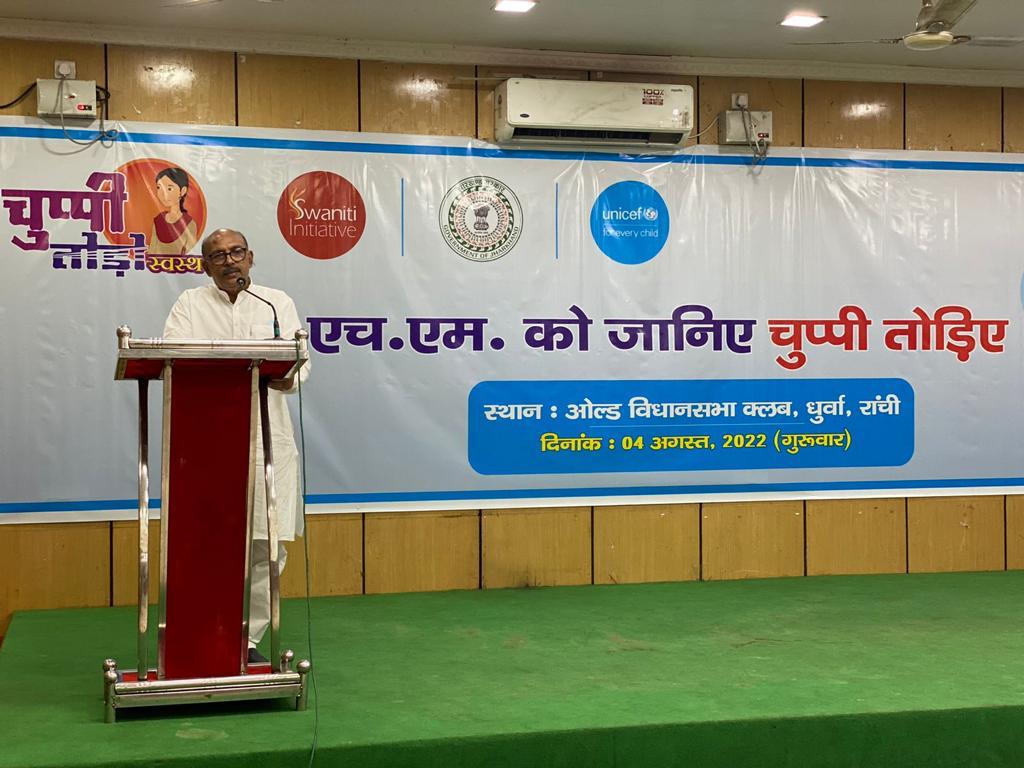

UNICEF Jharkhand in collaboration with Swaniti Initiative, organized a roundtable today on Menstrual Hygiene Management – “MHM Ko Janiye Chuppi Todiye”.
Hon’ble Speaker of Vidhan Sabha, Shri Rabindra Nath Mahato graced the occasion as the Chief Guest in the roundtable. Around 10 MLAs such as Purnima Niraj Singh, Uma Shankar Akela, Amit Kumar Mandal, Pushpa Devi, Neha Tirkey, Kishun Kumar Das, Narayan Das, DeepakBirua, Ramchandra Singh, and Vinod Kumar Singh participated in the interaction.

Dr. Kaninika Mitra, Chief, UNICEF Jharkhand, Ms. Astha Alang, Communication, Advocacy and Partnership Officer, UNICEF Jharkhand; Kumar Premchand, WASH Specialist, UNICEF Jharkhand and Laxmi Saxena, WASH Officer, UNICEF Jharkhand also participated in the roundtable along with Mrs. Uma Bhattacharjee, Trustee, Swaniti Initiative.
While addressing the roundtable, the Honourable Speaker of Vidhan Sabha, Shri Rabindra Nath Mahato said, “We need to start talking about menstrual hygiene management of adolescent girls and women. Surprisingly, amongst other public health concerns, menstrual health is not spoken about much. But now is the time to break the silence over this issue and start talking about it. While there has been improvement in developing comprehensive approaches to MHM, the role of men in supporting menstrual hygiene has been lacking. Men can support women to manage menstruation effectively such as in the household, community, school, and work. Men influence women’s experiences of MHM through many roles, including as husbands, fathers, brothers, students, peers, teachers, employers, and policymakers.”
He further added, “Access to water and sanitation facilities for safe menstrual hygiene management is extremely important at household level as well as at institutions. The far-off regions with tribal populations in Jharkhand face issues in the penetration of basic sanitation and water infrastructure that result in unsafe menstrual hygiene management. Thus, we need to look at the menstrual health issue through the lens of infrastructure and basic water and sanitation facilities for the masses.”

Dr. Kaninika Mitra, Chief, UNICEF Jharkhand, said, “Menstruation is a completely natural process, but it remains a social taboo. The myths associated with menstruation have an impact on the way it is perceived and managed, often creating a barrier to gender equality. Many girls and women continue to be socially ostracised during their periods; their mobility is restricted, and they are considered impure. It has a direct impact on girls' access to education and good health. Menstruation remains a topic that not just men, but many women are also uncomfortable discussing. We must therefore break these taboos and bring MHM to the forefront.”
MHM Ko Janiye Chuppi Todiye Quiz was conducted by Kumar Premchand, WASH Specialist, UNICEF Jharkhand. Laxmi Saxena, WASH Officer, UNICEF Jharkhand gave a technical presentation on Menstrual Hygiene Management.